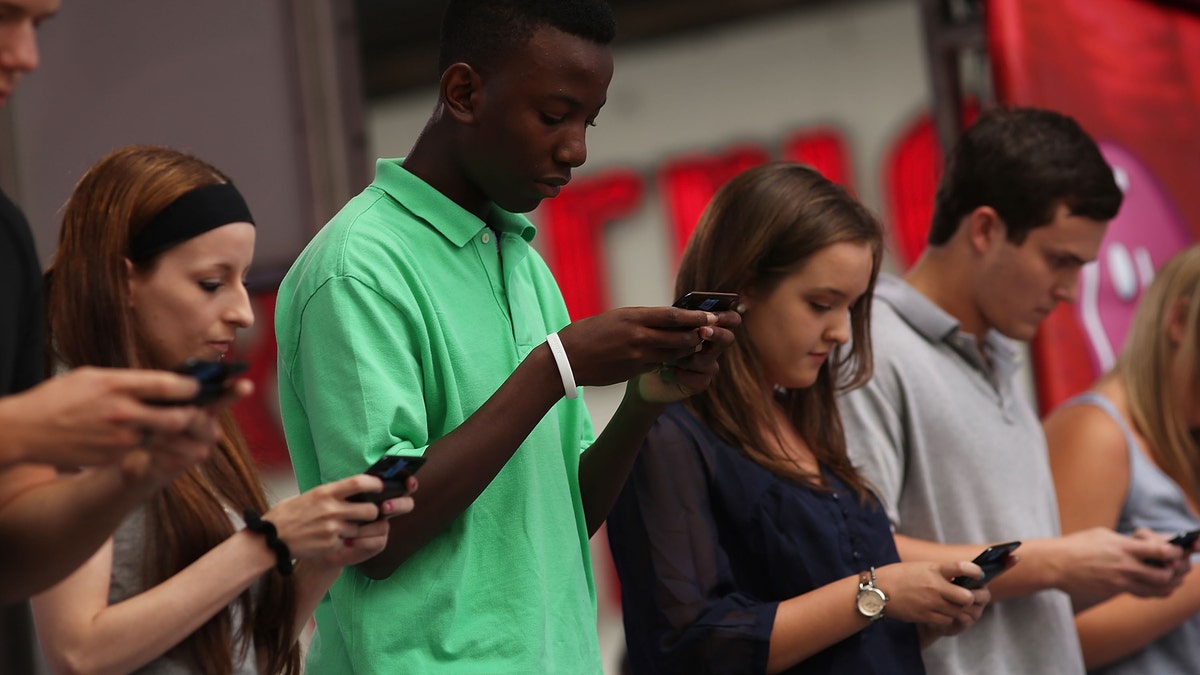
NEW YORK, NY - AUGUST 08: Contestants in the Sixth Annual LG Mobile U.S. National Texting Championships compete on stage on August 8, 2012 in New York City. This years winner was again Austin Wierschke who took home $50,000. (Photo by Spencer Platt/Getty Images) (2012 Getty Images)
It breaks my heart to think that one of the reasons behind massacres like the one in Colorado might very well be the lack of a very basic human trait—empathy.
I had a close encounter with how failure to instill empathy in kids can impact their ability to relate to others, even when the “others” are their own flesh and blood. I don't mean to imply that what happened to me is anywhere near as horrifying as what the victims of this and other mass shootings and their families went through. I only want to underscore that when adults don’t model empathy early on, when kids don’t learn how to be sensitive to other people’s feelings, and when we let narcissism go unchecked, various degrees of bad things can happen.
A couple of years ago, I was in Argentina in December. I hadn’t spent the holidays with my family in many years, and I was happy to share Christmas Eve dinner with my immediate family at my brother’s home. His younger daughter, who was 16 at the time and for whose Quinceañera I had made a special trip the year before, had decided to spend the evening with her friends. I was hurt and I called her on her cell phone to express my disappointment. When her older sister told her how upset I was, the younger one replied via text, “She’ll get over it.” I was so bothered by her attitude that instead of leaving her Christmas gifts at her father’s house that night, I took them back with me.
I was coming back to the U.S. the following afternoon, straight from my uncle’s house where my extended family was celebrating Christmas Day. My niece barely said hello to me. At some point, I approached her and asked,
“Is there anything you’d like to say to me?”
“No. Nothing. Is there anything you would like to say to me?” was her defiant response.
I walked away feeling even more hurt than before. She behaved as if she didn’t care, as if she couldn’t imagine why I was upset.
The afternoon breezed by and soon it was time for me to change into my travel clothes. I was in the middle of doing just that when she walked in.
“I’m sorry,” she started.
“What are you sorry for?” I asked, trying to find out if she knew what the issue was.
“Well, I should’ve said I was sorry when you asked me before.”
She was oblivious to the fact that I hadn’t been in town for the holidays for many years and that she could have seen her friends any other day. The truth was that she was just saying she was sorry because she didn’t want me to take her gifts back to New York.
I tried to explain that had she been at my brother’s the night before, where it was just our immediate family, we would have had an opportunity to hang out together more.
And as I reminded her that I had travelled 5,000 miles at the height of my work season for her birthday party the year before, I started crying. I admit that I was sad about the situation and probably overly emotional because it was time to say goodbye to my entire family.
But here’s the thing – she remained unperturbed, leaning against the door, looking at me as if I were a stranger, never making any attempt to calm me down, hug me, tell me she didn’t mean to upset me. Anything. I remember clearly thinking, “Oh my God, she has no empathy.” And that thought terrified me.
I spoke to my brother at length after that episode. I’m not sure how much parents can do to instill empathy in teenagers, but it’s worth making every effort.
We all know this is a generation that grew up glued to screens and hooked on earphones. A generation that has an easier time texting people in the same room than having a direct conversation. Well, I believe that this self-isolation, combined with a culture of narcissism encouraged by social media and reality TV, is taking a toll on teenagers and young adults.
And even though I’m not implying that someone like my niece, who on the surface is just behaving like any other self-absorbed teenager, is going to end up shooting a movie theater full of unsuspecting strangers, I am saying that lack of empathy breeds trouble for our society.
How to make sure our kids can put themselves in someone else’s shoes and how to make sure they can always distinguish what’s real and what’s not is a conversation worth having.
